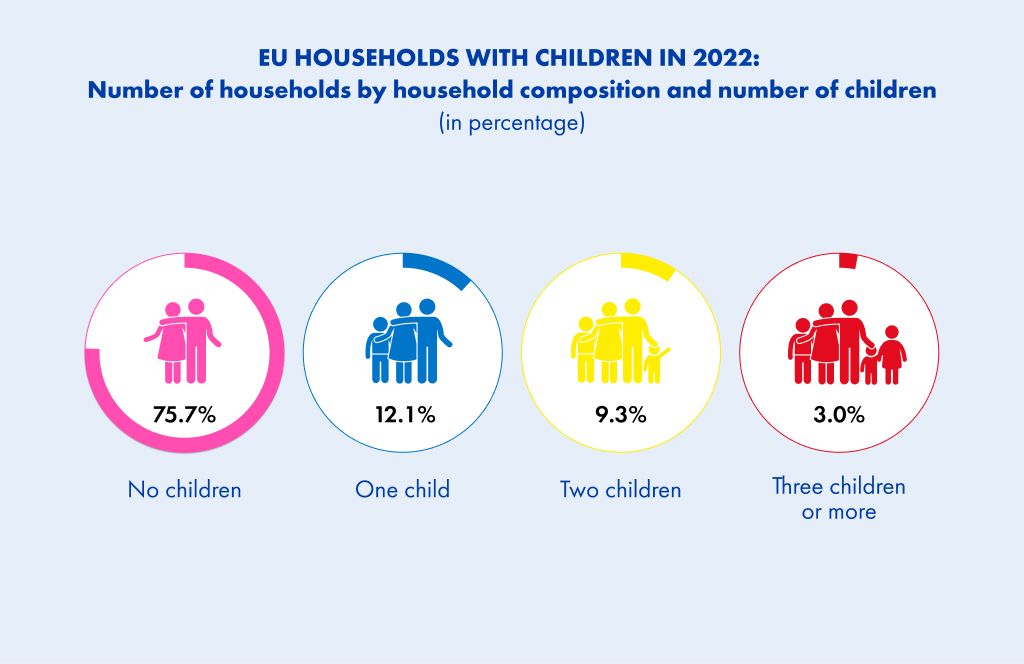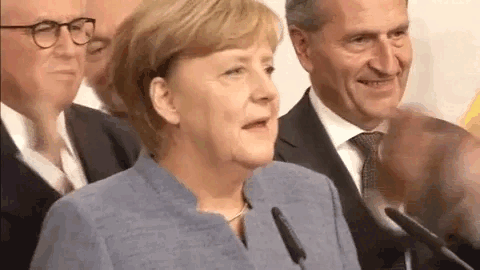Issue #148
Guten Morgen! Here’s another edition of your favorite weekly with the latest happenings from Germany and Europe. This week, we first investigate how Europe is balancing regulation and innovation around AI; we look for the missing 60 billion Euros from the German budget and then take a peek behind the curtain of Germany’s digital drama. In Great Britain, fiscal decisions are stirring up the pot ahead of the upcoming General Election, while Christian in his WOOM evaluates the very different reactions from the political parties, both the opposition and coalition to the recent high court ruling on the German budget (aka the missing 60 billion Euros). We hope you enjoy the read as much as your weekend! Anna Szilvia WHAT TO WATCH THIS WEEK: Germany, France, and Italy’s AI Tango – A Dance of Regulation and Innovation In a twist of high-tech diplomacy, Germany, France, and Italy have tripped into the arena of AI regulation, presenting a lively waltz of ideas to govern artificial intelligence. The trio’s shared position paper suggests the regulation of foundation models, with an emphasis on “mandatory self-regulation through codes of conduct”. The joint paper declares that the EU’s proposed AI Act should regulate the application of AI and not the technology itself, reassuring skeptics that the true risks lie in AI systems’ application, not in the technology’s inherent mischief. Amidst the negotiations at the European level, the trio embraces the idea that developers must develop ‘model cards’ for their foundation models. These model cards are expected to reveal information about a machine-learning model’s capabilities, limitations, and more. The trio suggests that no sanctions should be imposed initially. However, if the code of conduct is violated after a reasonable time, a sanctions system may be introduced. Criticism of the German-French-Italian position paper has already emerged, highlighting concerns about the contradictory nature of “mandatory self-regulation” and potential incentives for non-compliance. Let’s hope this diplomatic tango doesn’t turn into a European robot boogie. INSIGHTS FROM PARLIAMENT: Olaf’s search for 60 billion euros, Episode II Germany, a country of financial reliability. The global financial crisis? The European debt crisis? No problem for the German budget; there were even negative interest rates on German government bonds – the German state was PAID to borrow money. Sounds strange, and it is. However, these times are changing, or how else can one explain that the federal government has just lost at least 60 billion euros?! Our loyal readers will recall the last issue of the Krautshell, and to all others: it’s better to start reading regularly! The federal government takes the decision of the Federal Constitutional Court (which declared the transfer of corona loans unconstitutional) very seriously. The Federal Ministry of Finance imposed a budget freeze this week not only for the affected Climate and Transformation Fund but also for almost the entire federal budget. The originally planned final budget committee meeting in parliament for the federal budget 2024 had to be postponed at short notice. Instead, there was an expert hearing on overcoming this crisis. However, how this situation will ultimately be resolved and how the billion-euro hole in the federal budget can be plugged remain unclear. These issues are further complicated by the different political visions of the coalition partners. The Social Democratic Party (SPD) demands a suspension of the debt brake (which limits the taking on of debts), the Greens generally agree with this, while the Free Democratic Party (FDP) advocates for a significant reduction in social benefits. The positions are far apart, and none of the sides has a parliamentary majority. The continuation of the drama follows. THE BIG PICTURE: Germany’s Digital Drama Unveiled A unique spectacle unfolded at the recent German government’s digital summit as conflicting viewpoints on the regulation of artificial intelligence (AI) clashed. Ministers such as Robert Habeck and Volker Wissing took center stage in this tragicomedy, vehemently opposing any restrictions on foundational models. For Habeck, it was crucial that Germany and Europe take proactive measures to avoid dependence on US giants, a situation already standard in social networks. However, it wasn’t just AI regulation dominating the stage. Discussions also revolved around financing the digital transformation, with Wissing portraying digitalization as a means of salvation rather than a cost factor. Despite the government touting some successes, Bitkom Association President Ralf Wintergerst remained skeptical, stating, ‘There’s been hardly any progress on significant issues such as the digitalization of administration.’ This was evident during the debate on digital identities: abundant eloquence, yet scant plans for funding. Hopefully, planned campaigns won’t falter due to budgetary complications – a true drama in several acts. Overall, an impressive performance unveiling the spectacle of a digital failed state – a masterclass in political absurdity. The lingering question: Will the curtain rise on a new act of digital transformation, or will this tragicomic script persist? The UK has two big fiscal events of the year, the Autumn Statement and the Spring Budget. With a General Election due next year, Wednesday was one of the last big chances for the Chancellor of the Exchequer (our Finance Minister) Jeremy Hunt to make his mark. In a move that’s likely to elicit more than a few smiles from pensioners across the UK, the government has announced a notable 8.5% increase in the state pension starting April 2024. This decision might just be a nod to the fact that a significant portion of Conservative voters are in their golden years. The Chancellor has also made a notable play for the self-employed by abolishing Class 2 National Insurance (one key tax in our payslips each month). This substantial saving is a potential game-changer for freelancers and small business owners, another key Conservative constituent… Additionally, in a move that’s sure to have employees across the UK rechecking their pay slips, Hunt has announced a 2-percentage point cut in employee National Insurance rates. This early New Year’s gift means a £450 yearly saving for those earning £35,000. The woman hoping to be the first ever female Chancellor, Labour’s Rachel Reeves offered a stark contrast to this seemingly positive news. She criticized the government’s economic strategy, pointing out stagnant growth under Conservative leadership. Reeves drew attention to the Office for Budget Responsibility’s downgraded growth forecasts and argued that Hunt’s recent announcements are insufficient to counter the rising cost of living, leaving working people worse off through fiscal drag. Her stern warning suggests that she believes the public will see through these measures. That remains to be seen, although we will know within the next year when the public go to the polls… Source: ec.europa.eu Here are three appointments for next week that you should have on your radar: Dolosus in Uno, Dolosus in Omnibus (He who is deceitful in one matter, is deceitful in all) Okay, today’s piece is a bit more extensive, as I need to provide some context. In the last Krautshell, we discussed the ruling of the Federal Constitutional Court, which stated that the Federal Government cannot repurpose a 60 billion Euro special budget, originally allocated for managing the COVID crisis but not needed, for the transformation of the German economy (climate protection and the like). Members of the opposition CDU/CSU parliamentary group had filed a complaint through a constitutional “norm control procedure” and received substantial backing from the judges. The outcome: A state of emergency that justifies expanded borrowing must be solidly justified anew each year. Simply relying on an old credit line is, therefore, not an option. Opposition leader Friedrich Merz achieved a significant political victory with this. He handled it with a mild, celebratory tone but was primarily serious and statesmanlike, in line with the tradition of the “Chancellor’s party” CDU, whose last chancellor, Angela Merkel, also tended to respond to such victories not with a “Yeah!” but more of an extended “So!” As you know, also in German politics it’s customary to associate parties with specific colors. The CDU, for instance, is often referred to as the “Blacks,” a term derived not by chance from the color of political Catholicism. It’s an old tradition in the CDU to carry the dignity and statesmanship of those who literally carry it like a “monstrance” before them. Therefore, their rhetoric is mild in the face of a legal victory, because it’s not a dispute, but rather the CDU naturally knowing the law and thus more like a nodding Papa – or a Mama saying “So!” after being proven right. Every power player knows exactly how habitus becomes habit. They speak selectively to people, or sometimes not at all. What some high-born or high-elected individuals see as dignified and beneath their dignity is sometimes just a noble expression for intense pettiness. As it has always been, whether in world politics or local clubs. Now, just a Krautshell summary: What attitude have the “traffic-light”-coalition partners adopted in reaction to the budgetary debacle? The Liberals and their leader Christian Lindner, ironically the Federal Minister of Finance and quite responsible for the constitutionality of the budget: He first threw out his state secretary and is quite upset, like Chancellor Olaf Scholz said: Nothing. Maybe he yelled at his coalition partner Minister Lindner, but then under Chatham House rules, nobody knows anything. His motto for the public sphere: Don’t get rattled, especially not by the Christian-democrats or the Constitutional Court. Like… However, Green Vice Chancellor Habeck reacted in an interesting way. He said that prices for electricity, gas, and district heating might rise significantly and people could thank the Union and CDU leader Merz. Probably a little slip-up during an early morning interview. He knows that as the perpetrator (of the budgetary debacle), you can’t blame the whistleblower (Merz) just because the act wouldn’t have been noticed without the whistleblowing. Any left-wing government suffers anyway from its habitus of proceeding in a allegedly Marxist manner. The Greens, in particular, are often accused of dividing society into different identity groups, defining victims and necessities, and then dispensing their unsolicited benevolence to the people through the habit of empathy. This reminds me of the principle in Roman law, “Falsus in uno, falsus in omnibus,” (False in one thing, false in everything) which – from a modern point of judicial view – similarly deals immaturely with people, but it speaks volumes. A corresponding German proverb says, “He who lies once is not believed, even when he speaks the truth.” There’s also a fitting English adaptation in John Wick 4: “How you do anything, is how you do everything.” A worthy (inquisitory) mission for the “morally superior” opposition: For he who is quite deceitful once, may well be so in other matters. ☝️ Issue #148


FIRST, SOME SOLID INTEL:
AND WHAT’S UP IN GREAT BRITAIN?
TAKE A BREAK, GIVE YOUR EYES A REST:

LONG STORY SHORT:
OUTLOOK:
When?
What?
November 28th, 2023
Berlin Cyber Security Summit 2023
November 29th & 30th, 2023
Berlin Security Conference
November 28th – December 12th, 2023
COP 28 in Dubai
WHAT’S ON OUR MINDS:






